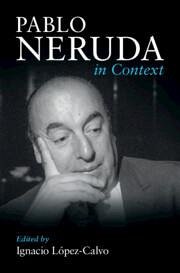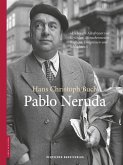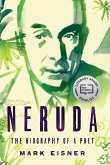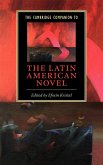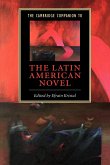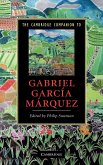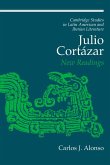Pablo Neruda in Context
Herausgeber: López-Calvo, Ignacio
Pablo Neruda in Context
Herausgeber: López-Calvo, Ignacio
- Gebundenes Buch
Andere Kunden interessierten sich auch für
![Pablo Neruda Pablo Neruda]() Hans Christoph BuchPablo Neruda22,00 €
Hans Christoph BuchPablo Neruda22,00 €![Neruda Neruda]() Mark EisnerNeruda19,99 €
Mark EisnerNeruda19,99 €![The Cambridge Companion to the Latin American Novel The Cambridge Companion to the Latin American Novel]() Efraín Kristal (ed.)The Cambridge Companion to the Latin American Novel67,99 €
Efraín Kristal (ed.)The Cambridge Companion to the Latin American Novel67,99 €![The Cambridge Companion to the Latin American Novel The Cambridge Companion to the Latin American Novel]() Efraín Kristal (ed.)The Cambridge Companion to the Latin American Novel41,99 €
Efraín Kristal (ed.)The Cambridge Companion to the Latin American Novel41,99 €![Getting Lost Getting Lost]() Annie ErnauxGetting Lost9,99 €
Annie ErnauxGetting Lost9,99 €![The Cambridge Companion to Gabriel Garcia Marquez The Cambridge Companion to Gabriel Garcia Marquez]() The Cambridge Companion to Gabriel Garcia Marquez88,99 €
The Cambridge Companion to Gabriel Garcia Marquez88,99 €![Julio Cortazar Julio Cortazar]() J. AlonsoJulio Cortazar124,99 €
J. AlonsoJulio Cortazar124,99 €-
-
-
Produktdetails
- Verlag: Cambridge University Press
- Seitenzahl: 417
- Erscheinungstermin: 30. November 2025
- Englisch
- ISBN-13: 9781009635424
- ISBN-10: 1009635425
- Artikelnr.: 73929437
- Herstellerkennzeichnung
- Libri GmbH
- Europaallee 1
- 36244 Bad Hersfeld
- gpsr@libri.de
Foreword: A Bell and a Pencil with Green Ink. Reflections of a Young Poet;
Introduction: The Author, His Life, and His Oeuvre; Part I. Residence and
Travel: 1. A lo lejos alguien canta: Solitude as rite of passage and
diplomatic life in East Asia, 1927-1932; 2. Pablo Neruda in Buenos Aires:
An urban approach to his stay and sociability; 3. Pablo Neruda's España en
el Corazón and the Spanish civil war; 4. France in the life and poetry of
Pablo Neruda; 5. Of commitments and polemics: Neruda in Mexico, between
Siqueiros and Paz; 6. Departure and return: Pablo Neruda, the traveler who
always returned; Part II. Landmark Events and Relationships: 7. Neruda's
misreadings: Myth and reality in Chilean history; 8. The Awards and honors
of Pablo Neruda: The people's poet and politician; 9. Neruda on poetics:
The 1971 nobel lecture; 10. Pablo Neruda: Poetry, monument, ruin; 11. The
poet in New York: Pablo Neruda and the 1966 International P.E.N. club
conference; 12. Women in the poet's life: More than muses; 13.
Subjectivities and reception: Pablo Neruda on the 100th anniversary of
Veinte poemas de amor y una canción desesperada; Part III. Literary
Influences and Poetic Evolution: 14. Neruda and his precursors: Negotiating
one's debts; 15. The adolescent poetry of Pablo Neruda (1920-1924): From
Crepusculario to Veinte poemas de amor y una canción desesperada; 16. The
confluence of avant-gardist form and realist content in residencia en la
tierra; 17. Poetic evolution III (1950-1953): The politics and historicism
of Pablo Neruda in canto general and España en el corazón; 18. Poetic
evolution IV (1954-1957): The triptych of elemental odes, materialism, and
everyday humble objects; 19. From late to posthumous poems: Neruda's
forgotten futurity; Part IV. Other Genres: 20. Fulgor y muerte de Joaquín
Murieta and the European political theater tradition; 21. Letters, life,
and poetry: A pending task in the Nerudian universe; 22. The (In)visibility
of the translator: Neruda and 44 poetas rumanos; 23. Amo las cosas loca,
locamente': The poet as collector in Neruda's Odes; 24. We are many': How
Neruda confessed to his contradictions in his memoirs; 25. Musical
adaptations of Canto general; 26. Burning patience: Skármeta's invention of
Neruda; Part V. Politics, Race, and Ecocriticism: 27. Pablo Neruda's
political and intellectual trajectory: Between the author and the militant;
28. Pablo Neruda: on machu picchu and revolution; 29. The marxian Worldview
in selected poems of Pablo Neruda; 30. Race and ethnicity: Pablo Neruda's
black Atlantic; 31. Beyond the national poet: Neruda according to
Chihuailaf; 32. Ecocritical readings: Neruda, critic of progress; Part VI.
Worldwide Influence, Reception, and Legacy: 33. Poetry as World literature.
The case of Pablo Neruda; 34. Fermenting the grapes of history:
Decolonization and anti-imperialism in Neruda's India; 35. Neruda's legacy
in China and Japan: from Ai Weiwei to Taeko Tomiyama; 36. Pablo Neruda from
the Pacific to Palestine; 37. Pablo Neruda in dialogue with Nizâr Qabbânî
and Mahmûd Darwîsh; 38. Neruda's life and poetry in the United States,
United Kingdom, and the rest of the anglophone World; 39. Between Pushkin
and Stalin: Pablo Neruda in the Soviet Union; Epilogue: 40. Of the
time-worn human spring': On Pablo Neruda's legacy.
Introduction: The Author, His Life, and His Oeuvre; Part I. Residence and
Travel: 1. A lo lejos alguien canta: Solitude as rite of passage and
diplomatic life in East Asia, 1927-1932; 2. Pablo Neruda in Buenos Aires:
An urban approach to his stay and sociability; 3. Pablo Neruda's España en
el Corazón and the Spanish civil war; 4. France in the life and poetry of
Pablo Neruda; 5. Of commitments and polemics: Neruda in Mexico, between
Siqueiros and Paz; 6. Departure and return: Pablo Neruda, the traveler who
always returned; Part II. Landmark Events and Relationships: 7. Neruda's
misreadings: Myth and reality in Chilean history; 8. The Awards and honors
of Pablo Neruda: The people's poet and politician; 9. Neruda on poetics:
The 1971 nobel lecture; 10. Pablo Neruda: Poetry, monument, ruin; 11. The
poet in New York: Pablo Neruda and the 1966 International P.E.N. club
conference; 12. Women in the poet's life: More than muses; 13.
Subjectivities and reception: Pablo Neruda on the 100th anniversary of
Veinte poemas de amor y una canción desesperada; Part III. Literary
Influences and Poetic Evolution: 14. Neruda and his precursors: Negotiating
one's debts; 15. The adolescent poetry of Pablo Neruda (1920-1924): From
Crepusculario to Veinte poemas de amor y una canción desesperada; 16. The
confluence of avant-gardist form and realist content in residencia en la
tierra; 17. Poetic evolution III (1950-1953): The politics and historicism
of Pablo Neruda in canto general and España en el corazón; 18. Poetic
evolution IV (1954-1957): The triptych of elemental odes, materialism, and
everyday humble objects; 19. From late to posthumous poems: Neruda's
forgotten futurity; Part IV. Other Genres: 20. Fulgor y muerte de Joaquín
Murieta and the European political theater tradition; 21. Letters, life,
and poetry: A pending task in the Nerudian universe; 22. The (In)visibility
of the translator: Neruda and 44 poetas rumanos; 23. Amo las cosas loca,
locamente': The poet as collector in Neruda's Odes; 24. We are many': How
Neruda confessed to his contradictions in his memoirs; 25. Musical
adaptations of Canto general; 26. Burning patience: Skármeta's invention of
Neruda; Part V. Politics, Race, and Ecocriticism: 27. Pablo Neruda's
political and intellectual trajectory: Between the author and the militant;
28. Pablo Neruda: on machu picchu and revolution; 29. The marxian Worldview
in selected poems of Pablo Neruda; 30. Race and ethnicity: Pablo Neruda's
black Atlantic; 31. Beyond the national poet: Neruda according to
Chihuailaf; 32. Ecocritical readings: Neruda, critic of progress; Part VI.
Worldwide Influence, Reception, and Legacy: 33. Poetry as World literature.
The case of Pablo Neruda; 34. Fermenting the grapes of history:
Decolonization and anti-imperialism in Neruda's India; 35. Neruda's legacy
in China and Japan: from Ai Weiwei to Taeko Tomiyama; 36. Pablo Neruda from
the Pacific to Palestine; 37. Pablo Neruda in dialogue with Nizâr Qabbânî
and Mahmûd Darwîsh; 38. Neruda's life and poetry in the United States,
United Kingdom, and the rest of the anglophone World; 39. Between Pushkin
and Stalin: Pablo Neruda in the Soviet Union; Epilogue: 40. Of the
time-worn human spring': On Pablo Neruda's legacy.
Foreword: A Bell and a Pencil with Green Ink. Reflections of a Young Poet;
Introduction: The Author, His Life, and His Oeuvre; Part I. Residence and
Travel: 1. A lo lejos alguien canta: Solitude as rite of passage and
diplomatic life in East Asia, 1927-1932; 2. Pablo Neruda in Buenos Aires:
An urban approach to his stay and sociability; 3. Pablo Neruda's España en
el Corazón and the Spanish civil war; 4. France in the life and poetry of
Pablo Neruda; 5. Of commitments and polemics: Neruda in Mexico, between
Siqueiros and Paz; 6. Departure and return: Pablo Neruda, the traveler who
always returned; Part II. Landmark Events and Relationships: 7. Neruda's
misreadings: Myth and reality in Chilean history; 8. The Awards and honors
of Pablo Neruda: The people's poet and politician; 9. Neruda on poetics:
The 1971 nobel lecture; 10. Pablo Neruda: Poetry, monument, ruin; 11. The
poet in New York: Pablo Neruda and the 1966 International P.E.N. club
conference; 12. Women in the poet's life: More than muses; 13.
Subjectivities and reception: Pablo Neruda on the 100th anniversary of
Veinte poemas de amor y una canción desesperada; Part III. Literary
Influences and Poetic Evolution: 14. Neruda and his precursors: Negotiating
one's debts; 15. The adolescent poetry of Pablo Neruda (1920-1924): From
Crepusculario to Veinte poemas de amor y una canción desesperada; 16. The
confluence of avant-gardist form and realist content in residencia en la
tierra; 17. Poetic evolution III (1950-1953): The politics and historicism
of Pablo Neruda in canto general and España en el corazón; 18. Poetic
evolution IV (1954-1957): The triptych of elemental odes, materialism, and
everyday humble objects; 19. From late to posthumous poems: Neruda's
forgotten futurity; Part IV. Other Genres: 20. Fulgor y muerte de Joaquín
Murieta and the European political theater tradition; 21. Letters, life,
and poetry: A pending task in the Nerudian universe; 22. The (In)visibility
of the translator: Neruda and 44 poetas rumanos; 23. Amo las cosas loca,
locamente': The poet as collector in Neruda's Odes; 24. We are many': How
Neruda confessed to his contradictions in his memoirs; 25. Musical
adaptations of Canto general; 26. Burning patience: Skármeta's invention of
Neruda; Part V. Politics, Race, and Ecocriticism: 27. Pablo Neruda's
political and intellectual trajectory: Between the author and the militant;
28. Pablo Neruda: on machu picchu and revolution; 29. The marxian Worldview
in selected poems of Pablo Neruda; 30. Race and ethnicity: Pablo Neruda's
black Atlantic; 31. Beyond the national poet: Neruda according to
Chihuailaf; 32. Ecocritical readings: Neruda, critic of progress; Part VI.
Worldwide Influence, Reception, and Legacy: 33. Poetry as World literature.
The case of Pablo Neruda; 34. Fermenting the grapes of history:
Decolonization and anti-imperialism in Neruda's India; 35. Neruda's legacy
in China and Japan: from Ai Weiwei to Taeko Tomiyama; 36. Pablo Neruda from
the Pacific to Palestine; 37. Pablo Neruda in dialogue with Nizâr Qabbânî
and Mahmûd Darwîsh; 38. Neruda's life and poetry in the United States,
United Kingdom, and the rest of the anglophone World; 39. Between Pushkin
and Stalin: Pablo Neruda in the Soviet Union; Epilogue: 40. Of the
time-worn human spring': On Pablo Neruda's legacy.
Introduction: The Author, His Life, and His Oeuvre; Part I. Residence and
Travel: 1. A lo lejos alguien canta: Solitude as rite of passage and
diplomatic life in East Asia, 1927-1932; 2. Pablo Neruda in Buenos Aires:
An urban approach to his stay and sociability; 3. Pablo Neruda's España en
el Corazón and the Spanish civil war; 4. France in the life and poetry of
Pablo Neruda; 5. Of commitments and polemics: Neruda in Mexico, between
Siqueiros and Paz; 6. Departure and return: Pablo Neruda, the traveler who
always returned; Part II. Landmark Events and Relationships: 7. Neruda's
misreadings: Myth and reality in Chilean history; 8. The Awards and honors
of Pablo Neruda: The people's poet and politician; 9. Neruda on poetics:
The 1971 nobel lecture; 10. Pablo Neruda: Poetry, monument, ruin; 11. The
poet in New York: Pablo Neruda and the 1966 International P.E.N. club
conference; 12. Women in the poet's life: More than muses; 13.
Subjectivities and reception: Pablo Neruda on the 100th anniversary of
Veinte poemas de amor y una canción desesperada; Part III. Literary
Influences and Poetic Evolution: 14. Neruda and his precursors: Negotiating
one's debts; 15. The adolescent poetry of Pablo Neruda (1920-1924): From
Crepusculario to Veinte poemas de amor y una canción desesperada; 16. The
confluence of avant-gardist form and realist content in residencia en la
tierra; 17. Poetic evolution III (1950-1953): The politics and historicism
of Pablo Neruda in canto general and España en el corazón; 18. Poetic
evolution IV (1954-1957): The triptych of elemental odes, materialism, and
everyday humble objects; 19. From late to posthumous poems: Neruda's
forgotten futurity; Part IV. Other Genres: 20. Fulgor y muerte de Joaquín
Murieta and the European political theater tradition; 21. Letters, life,
and poetry: A pending task in the Nerudian universe; 22. The (In)visibility
of the translator: Neruda and 44 poetas rumanos; 23. Amo las cosas loca,
locamente': The poet as collector in Neruda's Odes; 24. We are many': How
Neruda confessed to his contradictions in his memoirs; 25. Musical
adaptations of Canto general; 26. Burning patience: Skármeta's invention of
Neruda; Part V. Politics, Race, and Ecocriticism: 27. Pablo Neruda's
political and intellectual trajectory: Between the author and the militant;
28. Pablo Neruda: on machu picchu and revolution; 29. The marxian Worldview
in selected poems of Pablo Neruda; 30. Race and ethnicity: Pablo Neruda's
black Atlantic; 31. Beyond the national poet: Neruda according to
Chihuailaf; 32. Ecocritical readings: Neruda, critic of progress; Part VI.
Worldwide Influence, Reception, and Legacy: 33. Poetry as World literature.
The case of Pablo Neruda; 34. Fermenting the grapes of history:
Decolonization and anti-imperialism in Neruda's India; 35. Neruda's legacy
in China and Japan: from Ai Weiwei to Taeko Tomiyama; 36. Pablo Neruda from
the Pacific to Palestine; 37. Pablo Neruda in dialogue with Nizâr Qabbânî
and Mahmûd Darwîsh; 38. Neruda's life and poetry in the United States,
United Kingdom, and the rest of the anglophone World; 39. Between Pushkin
and Stalin: Pablo Neruda in the Soviet Union; Epilogue: 40. Of the
time-worn human spring': On Pablo Neruda's legacy.

